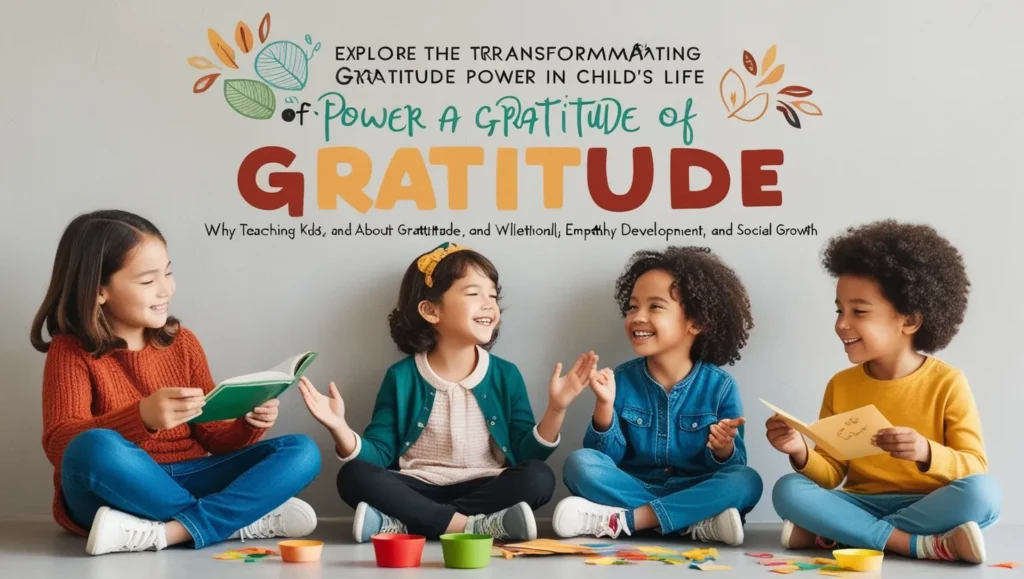Importance of Teaching Kids About Gratitude
In a world often driven by materialism and instant gratification, teaching children about gratitude is more crucial than ever. Gratitude is not just a polite “thank you” but a mindset that fosters happiness, empathy, and resilience. Instilling this habit early helps children appreciate the intangible joys of life, form positive relationships, and develop a strong emotional foundation. Here’s why teaching kids about gratitude matters and how to incorporate it into their lives. Importance of Teaching Kids About Gratitude
The Benefits of Gratitude for Children
- Enhanced Emotional Well-being
Gratitude encourages children to focus on what they have rather than what they lack. This shift in perspective cultivates contentment and reduces feelings of envy or dissatisfaction. Studies have shown that grateful children are happier, more optimistic, and less prone to stress or depression. - Improved Relationships
Teaching gratitude helps children value the people who contribute to their lives. Expressing appreciation strengthens bonds with family, friends, and teachers. Grateful children tend to be more empathetic and better at resolving conflicts. - Building Resilience
Gratitude equips children to handle challenges more effectively. Recognizing positives even in difficult times helps them bounce back with optimism and a sense of purpose. - Fostering Generosity
Grateful kids are more likely to share their resources, time, and kindness with others. They understand the importance of giving back, creating a cycle of positivity. - Academic and Social Success
Grateful children often exhibit better focus, greater motivation, and improved behavior at school. They also form healthier social connections, contributing to a balanced and successful life. Importance of Teaching Kids About Gratitude
Ways to Teach Gratitude to Kids
Importance of Teaching Kids About Gratitude
- Model Gratitude in Everyday Life
Children learn best by observing adults. Express your gratitude openly, whether it’s thanking a waiter, acknowledging a kind gesture, or sharing what you’re grateful for during family meals. - Encourage a Gratitude Journal
Encourage kids to write down three things they’re grateful for each day. This simple practice trains their minds to focus on positive experiences, no matter how small. - Make Gratitude a Daily Ritual
Create family traditions around gratitude. For instance, before bedtime, discuss one thing everyone appreciated during the day. - Teach the Value of Helping Others
Engage children in community service or charitable activities. Volunteering allows them to see how their actions can positively impact others and makes them appreciate what they have. - Use Storytelling to Illustrate Gratitude
Read books or share stories about characters who learn to be grateful. Discuss the lessons from these tales and how they apply to real life. - Acknowledge Efforts, Not Just Results
Celebrate the effort your child puts into tasks, even if the outcome isn’t perfect. This teaches them to appreciate the process and not take achievements for granted. - Express Thanks Together
Write thank-you notes for gifts or kindnesses received. Involve your child in the process to help them understand the importance of acknowledgment. - Limit Materialism
Avoid overindulging children with material possessions. Instead, emphasize experiences and quality time, showing them that happiness doesn’t always come from things. - Celebrate Cultural Gratitude Practices
Teach children about gratitude traditions from around the world. For example, Thanksgiving in the U.S. or the harvest festivals in many cultures. This expands their understanding and appreciation of gratitude.
Challenges and How to Overcome Them
- Entitlement Mindset
In today’s consumer-driven world, kids may develop a sense of entitlement. Counteract this by explaining the effort behind the privileges they enjoy, such as a meal or a holiday trip. - Resistance to Practice
Some children may find gratitude practices repetitive or boring. Keep it engaging by incorporating games or creative activities, like drawing pictures of what they’re thankful for. - Unrealistic Expectations
Gratitude isn’t an instant fix. Teaching this value requires patience and consistency. Reinforce it over time with positive reinforcement and encouragement.
The Long-term Impact of Gratitude
Children who grow up with a strong sense of gratitude are more likely to become well-rounded, compassionate adults. Gratitude teaches them to focus on the positives, fostering a mindset of abundance rather than scarcity. This perspective not only improves their personal lives but also equips them to contribute meaningfully to society. Importance of Teaching Kids About Gratitude
By teaching kids to appreciate life’s blessings, big and small, you’re giving them a tool that can transform their lives for the better. Gratitude is a gift that keeps on giving—instill it in your children today and watch them thrive tomorrow.
Final Thoughts
Teaching gratitude doesn’t require grand gestures; it’s the small, consistent acts that make a difference. Start by being a role model and encouraging gratitude as a family value. Remember, the seeds of gratitude you plant today will yield a lifetime of joy and fulfillment for your children. Importance of Teaching Kids About Gratitude

